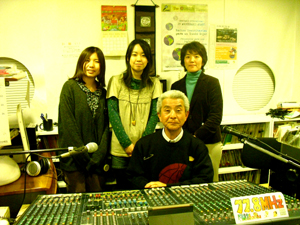There is a lot for schools and students to learn about the nature of relationships through volunteer activities.
Kobe Tokiwa University: Yasue Hirakawa, students affairs officer ; Miki Katori (Nursing Course student from Shiga Pref.); Kei Hirano (Nursing Course student form Wakayama Pref.)
Talk 1
Hirakawa: Both Ms Katori and Ms Hirano are members of the college’s jichi-kai (students’ council). First year students are not officials, they are delegated duties by senior members who are officials. Their activities include planning the college festival, etc. The jichi-kai also helps students who want to start an activity such as collecting donations, etc. Ms Katori and Ms Hirano are involved in collecting donations for the flood disaster in Sayo, Hyogo Prefecture.Katori: The movement got started when the chairperson of the jichi-kai suggested that we could help the flood victims of Sayo by collecting donations, and we were chosen to take responsibility for this when the college festival took place on November 21 and 22. We opened a donations booth at the festival and spent the two days collecting donations.
Hirano: We collected 21,365 yen.
Hirakawa: The college is more than willing to back up the students provided they complete the necessary procedures. Although some students or groups of students may have collected donations for disasters in the past, this was the first time the student council and college officially worked together. Although 15 years have passed since the Hanshin-Awaji Earthquake and people are beginning to forget it, it was nice to see our students volunteering to do something for the victims of the Sayo flooding.
Katori / Hirano: We have not had an opportunity to go to Sayo yet, and still haven’t delivered the donations.
Hirakawa: Of course, we intend to go to there and meet the people and discuss with them what we can do next.
Katori: I would like to continue the donations collection every at every year’s college festival. And personally, I would like to set up a network with students from other colleges in Hyogo.Hirakawa: I personally do not know of any other colleges that are involved in such a network, but there may be and perhaps some students may know more about this.
Talk 2
Hiyakawa: Tokiwa Univ. set up a new volunteer center in the college in August this year and we have been to Sayo. Teachers, students and students’ parents of Tokiwa High School and Kindergarten as well as local residents are involved.
Our activities include joining in community events from the planning stage and also conduct donation campaigns. We are in the process of planning a hot food booth for the earthquake memorial event. Although Ms Katori and Ms Hirano have not been to Sayo, many of the volunteer center members have, and have seen for themselves how awful a flood disaster can be and have reported on what they have seen and experienced. I went, too, and realized how hard it must be for the victims. I would like the two young students with us today to go and see and experience what it is like.
We are still at the planning stage of what we will do at the earthquake memorial event 1.17 in Shin Nagata, but we expect about 20 students to take part and will hold a hot food booth.
The college, located in Nagata, a district badly hit by the earthquake, has been designated by the Ministry of Education, Culture, Sports, Science and Technology to begin a course in disaster management in 2010 for first year students. Students will have lectures in practical disaster management; faculty and students will have courses in practical first aid, etc. The goal is the get as many people in Tokiwa University qualified in first aid so that we can be of use to the community if a disaster occurs. There are four courses at the colleges: nursing and laboratory technician courses are in the 4 year college and kindergarten teacher and dental hygienist courses are in the 2 year college. Through the students study of disaster management, we hope they will put what they have learned to use when they work at hospitals, kindergartens etc, should a disaster occur.
Although this new course is for new first year students, present students will be able to participate. The system at the college is flexible in that respect. We would like as many people as possible to participate. Although the Ministry’s program is for a period of 3 years, we at Tokiwa University hope to continue it with graduates and local people participating, too. There are limits to what the college can do on its own, so we hope to make use to as many people as possible.At the volunteer center we are now preparing for the 1.17 memorial event, but thinking further into the future we would like to pass on the experiences and messages of the earthquake to new students who know little about it. And with the new disaster management course produce young students who will be able to thinks and act for themselves in the event of a disaster.

